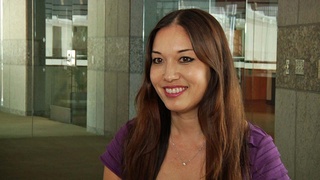Interviews
Changing fortunes of "identity art"
When I first came out, when I first came out doing it, again, it was hip in the art world to do identity studies in the early ‘90s. It was a big thing, and now it’s not as big a thing, in terms of what’s selling, in terms of the commercialism of artwork. But I would argue that it’s equally if not more important because it’s not in the conscious mind of what’s being put out there.
So for instance, I wanted to bring out an artist who did big identity work—Albert Chong, a Hapa artist from Jamaica who’s this amazing photographer—and I nominated him to come out as visiting artist and I said he does all this work about identity, and it got rejected in the first round because they said “Well, identity is not that hot of a topic right now.” And I had to write, “How can you say this?! This is college! This is students leaving home for the first time! How can you say identity—”
And they brought him out and he was this huge success. I mean, students loved him because he was talking about how it is you have every right to talk about your own processes, like the way you celebrate holidays, the way that you eat food, the way you relate to people, what you’re attracted to—that’s okay to talk about. So it’s changed, but we have to fight to keep it going.
Date: May 3, 2006
Location: California, US
Interviewer: Jim Bower
Contributed by: Watase Media Arts Center, Japanese American National Museum.
Explore More Videos





Marriage during anti-miscegenation laws
(b. 1930) Half Japanese and grew up in both Japan and the United States.

Growing Up in Japan
(b. 1930) Half Japanese and grew up in both Japan and the United States.

Postwar school-life
(b. 1930) Half Japanese and grew up in both Japan and the United States.

On Challenging Institutions
(1938-2020) Japanese American attorney and civil rights activist

Pop and Balls
(1938-2020) Japanese American attorney and civil rights activist

Re-examining Identity
(1941-2018) Japanese Canadian photojournalist and activist

Fitting in to both sides of her family
Jewish Japanese American journalist


Culture is an important part of one's identity
Jewish Japanese American journalist


